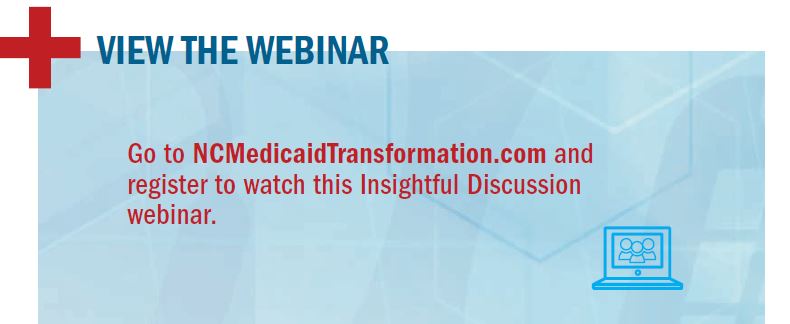
Atromitos is honored to have sponsored the "Insightful Discussion on Medicaid Transformation." We are grateful to Dave Richard, NC DHHS Deputy Secretary, and Kelly Crosbie, Director of Quality and Population Health, NC Medicaid for participating in this panel and to the supporting sponsors who helped bring this discussion to our community.
Despite a few delays, Medicaid Transformation is coming to North Carolina. This represents a notable change for providers, patients and the nonprofit organizations that support our communities. But more importantly, it represents tremendous opportunity. Through the Advanced Medical Home program and Healthy Opportunities, we will return greater clinical and operational autonomy to providers and create meaningful partnerships between providers, community-based organizations (CBOs) and other stakeholders to help patients achieve their best health.
This is going to be a new world requiring all of us to adjust, adapt and iterate rapidly to minimize disruption. As you confront these challenges and opportunities, it is important that you begin with a strategy. The team at Atromitos offers 70 years of collective experience in Medicaid, and in managed care and change management, specifically. Headquartered in Wilmington, NC, we understand the unique challenges that North Carolinians are facing. When navigating new waters, it is important to have a partner you can trust. We are passionately and fearlessly committed to helping you do big things. We would be honored to support you through this time of tremendous opportunity.

Medicaid covers about 65 million people nationwide, and in North Carolina it covers over 2 million people, which is about 20 percent of our population. Medicaid is the unifying center point of our social safety net. It typically represents one of the largest line items in any state budget and in North Carolina, where it represents over one-third of the state's budget at about $15 billion dollars per year. Medicaid is the primary payer for long-term care, and it accounts for one-sixth of all healthcare expenditures nationally. Given the significance of Medicaid to North Carolina, its upcoming transformation is an important issue for all stakeholders.
Understanding Medicaid Transformation
The overall goal of Medicaid transformation is to achieve greater financial sustainability and predictability, improve outcomes for enrollees, and to empower providers in new ways.
Originally, Medicaid transformation was slated to happen in February 2020, but has since been pushed back to July 2021. This complex endeavor involves many significant changes but can be broken down into four main building blocks. The first building block is the
transition to managed care, meaning Medicaid is going to be administered by private health plans that are contracted with the State. The second building block is the Medicaid
delivery system, which will allow the primary care provider to take on the role in providing care management directly to their patients. The third building block is
value-based payment which will happen over a five-year shift and it relies on the standardized HCPLAN (Health Care Payment Learning & Action Network) framework that is well-recognized and currently used in other States. The fourth building block relies on the previous three and it is
quality strategy, which focuses on better care, healthier people, and smarter spending.
What Providers Need to Know to Prepare for Transformation
Medicaid providers in North Carolina have a lot to learn as these changes roll out. Challenges inherent to such a large-scale implementation cannot be avoided. From a purely operational perspective, implementing managed care will require a massive technology implementation. As each plan works to implement multiple systems with a myriad of functions, challenges will arise. And while managed care plans have been operating nationally for several decades, each state has differences with their existing systems, rules, and policies. These plans must adapt to specific systems to incorporate their unique requirements.
Another challenge will be for Medicaid providers who have never engaged in managed care to learn how to operate in a managed care environment. There are a lot of moving parts to this transformation and ways for things to go wrong, but there are also ways to minimize some of the disruption through preparation.
First is credentialing. Federal Medicaid regulation requires providers receiving payments to be credentialed. This means that their licensure and certifications must be verified. And while today there are existing processes in place through the Department of Health and Human Services (DHHS) to meet these requirements in North Carolina, the transition to managed care does require additional verifications be made. This means additional paperwork and information needs to be gathered as the PHPs (Prepaid Health Plans) must meet accreditation standards that are above and beyond the current credentialing requirements.
Lessons from Other States
The DHHS has learned from these challenges in other states and is working towards implementing a data management solution through a centralized credentialing vendor that will act as a one-stop shop for providers. This vendor is not yet operational, but the DHHS is working to create a streamlined process for providers.
Out-of-date and inaccurate provider credentialing data can lead to things like disenrollment from the program, non-payment of claims, and a series of other challenges for the PHPs, providers, and patients. The good news about this is that you can begin the process to minimize these challenges. Developing internal checks and balances to ensure your administrative staff have policies and procedures that will help them verify and update this information on a regular basis greatly reduces disenrollment.
Claims payment has been, and is one, of the most common barriers to a smooth implementation of Medicaid managed care. Plans must comply with federal and state standards requiring them to pay claims on time, which in North Carolina will mean 90 percent of claims within 30 days of receipt. As we have seen in many states when there are system issues, processes fail, payments are delayed, and the impact to providers can be extensive. For instance, if you have a local clinic or a community-based provider left trying to make payroll and continuing to deliver services according to their contractual requirements, the situation needs to be remedied fairly quickly. Rather than crossing our fingers and hoping that North Carolina’s Medicaid transformation is different, we all need to be proactive and prepare for these challenges.
Next Steps
So, what
can you do? There are a few things you can make sure your office support team reviews. One example is the claim submission requirements for each PHP you contract with. There will be differences amongst them, and you can develop policies and procedures to facilitate your internal processes. This holds true for not just claims payment processes, but anywhere you need to be sharing and engaging in data and information sharing with the PHPs. These resources will hopefully alleviate most of the disruption for your organization.
Another significant change will be that providers now have to contract with managed care organizations. As providers are contacted by the PHPs about these agreements, what do they need to know? Understanding each of the contracts that are provided by the PHPs and reviewing them with detail is the first step. Next, take the contracts to your legal team, your financial team, and your operations team and have them go through them line-by-line so that they understand every component of the contract. Because this transformation is going to change how you operate, develop a plan for how you are going to adapt to these new changes. Being prepared and empowered as a contract negotiator is a critical component to success.
Atromitos is an SBA-certified woman-owned business headquartered in Wilmington, NC. Their team, collectively, has approximately seventy years of experience combined working in health law and policy operations and implementation, and their work falls within four particular areas: strategy and innovation, policy and research, fundraising and development, and marketing and communications. Atromitos works with organizations of all shapes and sizes, predominantly in the health and human services sector. Their specialty really is in working with organizations that are going through some form of change — whether it's big or small change, change coming from the inside, or change coming from the outside. Healthcare policy and procedure remains in a constant state of change, but what drives the team at Atromitos is ensuring that communities are achieving their best health and wellbeing. This is the main reason why they focus so much on the Medicaid program and its significance in our community.
Atromitos can help your business or non-profit prepare for the new Medicaid transformation. From contract negotiation, operational readiness, and ongoing support — their team of professionals is ready to get you started. Visit their website at www.AtromitosConsulting.com or call them today at 910-274-4075 to schedule your free, 30-minute consultation. To watch the entire Medicaid transformation webinar, please visit NCmedicaidTransformation.com.


 Medicaid covers about 65 million people nationwide, and in North Carolina it covers over 2 million people, which is about 20 percent of our population. Medicaid is the unifying center point of our social safety net. It typically represents one of the largest line items in any state budget and in North Carolina, where it represents over one-third of the state's budget at about $15 billion dollars per year. Medicaid is the primary payer for long-term care, and it accounts for one-sixth of all healthcare expenditures nationally. Given the significance of Medicaid to North Carolina, its upcoming transformation is an important issue for all stakeholders.
Medicaid covers about 65 million people nationwide, and in North Carolina it covers over 2 million people, which is about 20 percent of our population. Medicaid is the unifying center point of our social safety net. It typically represents one of the largest line items in any state budget and in North Carolina, where it represents over one-third of the state's budget at about $15 billion dollars per year. Medicaid is the primary payer for long-term care, and it accounts for one-sixth of all healthcare expenditures nationally. Given the significance of Medicaid to North Carolina, its upcoming transformation is an important issue for all stakeholders. 



